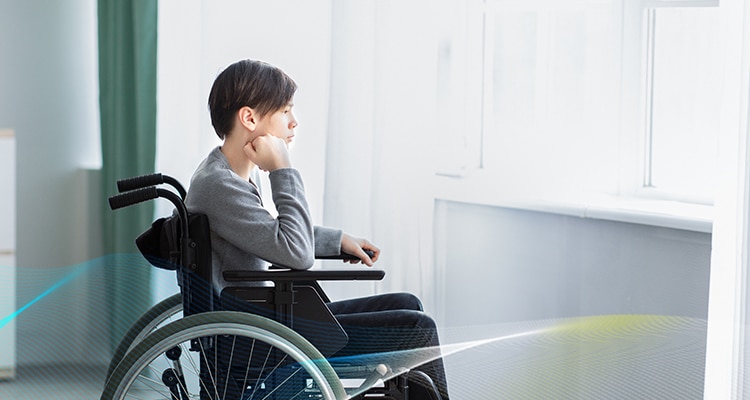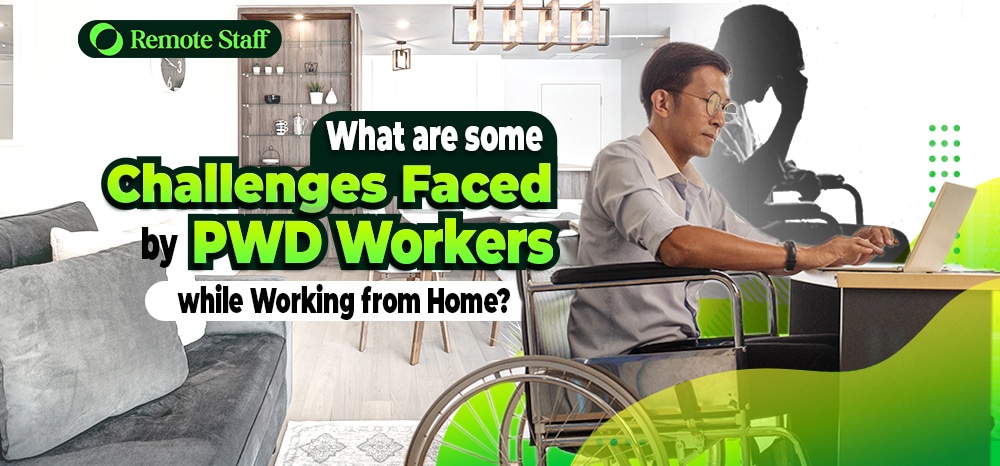With the world slowly getting back on its feet after the effects of the Pandemic, many are turning to online jobs to continue working. The pandemic has shown that working from home isn’t just a substitute for traditional work. It is an alternative. And none benefits more from this development than persons with disabilities (PWDs).
And yet, despite it being an overall change for the better for PWD workers, remote work also brings new challenges to them as well. These challenges, both old and new, continue to hinder the ability of PWD workers to find employment. The pandemic may have evened the field for PWD workers, but the road to true inclusivity at work continues to be a long one.
In this article, I will discuss some of the PWD work from home challenges in the Philippines. These challenges range from the lack of access to tools to do remote work; to the lack of confidence and motivation of PWD workers to try remote work in the first place.

The Lack of Appropriate Means to Conduct Remote Work
One of the most common PWD work from home challenges in the Philippines is the lack of access by PWD workers to remote work tools. Of course, this isn’t just a problem in the Philippines, as PWD workers from other countries also experience this.
Apps like Zoom, Skype, and Google Meet may be a part of an ordinary remote worker’s work tools, but PWD workers may have trouble using them. How can a person with hearing difficulties using zoom properly communicate with their employers? Or what about visually impaired workers? How can they do remote work if they have difficulty adjusting to a virtual setup?
This lack of easily accessible apps hinders the ability of PWD workers to keep up with ordinary workers in a remote setup. This circumstance then leads, predictably enough, to employers being hesitant in hiring them.

Being Unaware of the Many Remote Work Opportunities Available to them
Another common problem, and one that is unfortunately common in the Philippines, is the fact that PWD workers aren’t aware of remote working. Contrary to what some may think, there are many hardworking and creative PWD workers in the country. The problem lies with the fact that they aren’t aware of any remote work opportunities for them.
This issue is similar to how most PWDs aren’t even aware of their rights and privileges. PWD workers are more than willing to work; it’s just that they don’t know anyone hiring people like them. Not everyone has wealthy parents, you know.
Of course, there are exceptions to this. There’s a reason why there’s been an increase in PWD workers working remotely as of late. But there are still plenty of PWDs left behind because they didn’t have the privilege of having someone with connections.

Lack of Self-Confidence on the Part of the PWD Worker
This problem isn’t limited to remote work, as this has been something that occurs even in a traditional work environment. Just because there’s now plenty of opportunities doesn’t mean every PWD will take it. Many remain hesitant because they’re afraid that they’re not up to the job.
This lack of self-confidence stems from a variety of factors. Factors such as feelings of uselessness or a relative’s harsh words have a detrimental effect on how PWDs view themselves. Current events aren’t helping either. Seriously, who would want to work when the whole world seems to be one disaster away from falling apart?
Aside from these, the rapid change of technology can leave many PWDs wondering if they can actually keep up. Adjusting to these new forms of work can be stressful for some PWDs, especially if it’s their first time doing remote work.

The Stigma Employers have Regarding PWDs.
This list wouldn’t be complete without this. Of course, employers won’t say directly to a PWD’s face that the reason they don’t want to hire them is that they don’t like them. Unless they’re jerks, in which case, they don’t deserve you.
This stigma against PWDs remains pervasive even today. Many employers still consider hiring a PWD to be a waste of time and money. They believe that not only do they require special facilities, but they’re also less efficient than ordinary workers. So they actively avoid hiring PWDs to avoid experiencing these hassles.
Of course, this isn’t true, as many PWD workers can attest. Hopefully, with the increasing popularity of remote work for PWDs, this stigma will slowly die out.

The Mixing of Home and Work Life
I know, I know. Having difficulty adjusting to this new work setup is something that everyone experiences. But some work from home PWDs are having more trouble adjusting to this new setup than others. Remember, every PWD is different from one another, just like ordinary people. Each has their own specific set of needs that sets them apart from others.
Many PWDs experience an increase in anxiety and stress while working at home. These problems lead to an inability to focus on one’s tasks and a lowering of productivity. PWDs, especially those who have autism or ADHD, are particularly prone to this. With so many distractions in one’s house, it’s easy for them to lose focus on their work.

Conclusion
And here you go. Here are just a few of the PWD work from home challenges in the Philippines. Despite these challenges, we have made great strides towards work inclusivity. But we shouldn’t rest on our laurels just yet. There’s still a lot more to be done to overcome these challenges.

